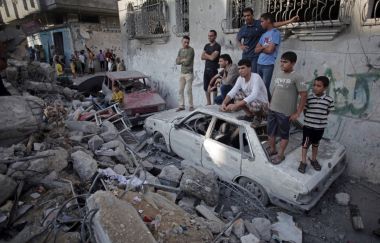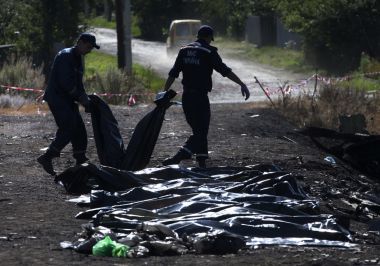How to pray when the world is in crisis

How do you pray for Gaza?
I usually rouse from sleep, in my rumpled sheets, with John Humphries or Evan Davies.
Exactly what I promised as a child to my parents, would never, EVER happen: I wake up with the radio alarm, tuned not to cheery Radio 1, but to sombre Radio 4. And whatever story breaks my slumber tends to stay with me during the day, and often into the week.
One morning last week I awoke to the news of further Israeli bombing in Gaza, in which one family had had five young members killed by the shelling and a whole community of houses was destroyed. A mother from the community related to the correspondent how she overheard her little daughter asking her sister: "Why did God create the Israelis?" and her sibling replied, "So they can kill us and we can go to heaven". The mother said to the journalist: "I don't think there is any understanding of the humanity on either side of the conflict, and I don't have any concept of peace left".
When I heard this tragic, personal account of the conflict, something deep within in me groaned in prayer, but I had absolutely no words to express it.
I had the same experience days before, waking to the words that "the mortuary in Baghdad was too full", after Iraqi security forces had found the bound and bullet-riddled bodies of 53 men. Something within me prayed, but words were inadequate.
It happened too when, via Twitter, news began to emerge of flight MH17 shot down over Ukraine with no survivors. 298 people, bodies scattered in pieces over fields, so very, very far from home. I cried, and within my gut I prayed, but what words could possible be uttered?
Paul writes in Romans 8:26: "The Spirit helps us in our weakness. We do not know what we ought to pray for, but the Spirit himself intercedes for us through wordless groans."

We're in good company if, like Paul, we don't have the vocabulary to articulate prayers to God. Sometimes, in the face of overwhelming need, all we can offer is a sob or a sigh or a groan – and sometimes we don't even have that and we rely on the Holy Spirit's wordless groans on our behalf. Words are containers that are sometimes not roomy enough to express the scale of injustice in the world and our desperation for change.
So, if we find ourselves without words to pray, then what do we do? I wonder if rather than asking about what we should be praying for in these circumstances, we might instead consider two different postures that we might adopt: wrestling and resting.
The prayers of Jesus in the garden of Gethsemane, as the full horror of the sin he will have to bear begins to come into view, are prayers of wrestling. The writer to the Hebrews puts it like this: "During the days of Jesus' life on earth, he offered up prayers and petitions with fervent cries and tears."
As we witness wickedness in the world, and tears of sorrow or anger well up, we have a tiny share in that Gethsemane experience – the fellowship of suffering. We wrestle in our emotions, empathising in the pain of fellow humans; we wrestle in our minds, in the rational sense of injustice; we wrestle in our spirits, because a bigger struggle is taking place in the heavenly realms.
But just as Jesus' prayers in Gethsemane led him into silence, our cries to God, may move us too into a wordless state of trust: from wrestling to rest. In engaging fully to bring to God the colossal issues facing our world, we can become exhausted and, aware of our own helplessness, we fall silent.
When we rest in prayer we're reminded that each of us has just one eye up against the keyhole, peering in to what needs to happen next in the world, whereas God has the floorplans of the whole house.
We are reminded too that it is done, it is finished. Jesus Christ – the alpha and omega, the beginning and the end – has the universe wrapped up in justice and peace that inexplicably overcomes the suffering of today. And we're reminded that this in no way depends on us.
So a rhythm emerges between wrestling and resting. In rest, we surrender to God all our longings for the world. But the more deeply we rest in his holy presence, the more acutely aware we become of all the things that are at odds with God's intentions for the world, moving us to wrestle in prayer once again, as we earnestly seek change.
Thomas Merton writes: "Prayer is not just a formula of words, or a series of desires springing up in the heart – it is the orientation of our whole body, mind, and spirit to God in silence, attention, and adoration... prayer is a conversion of our entire self to God."
This prayer – the unceasing prayer of living in the very presence of God – is where our rhythm finds its equilibrium. So as we turn our face into the atrocities of today, may we find too that our entire posture of our very lives, is a prayer offered to God for our world.
Alexandra Lilley is a curate in the East End of London.











